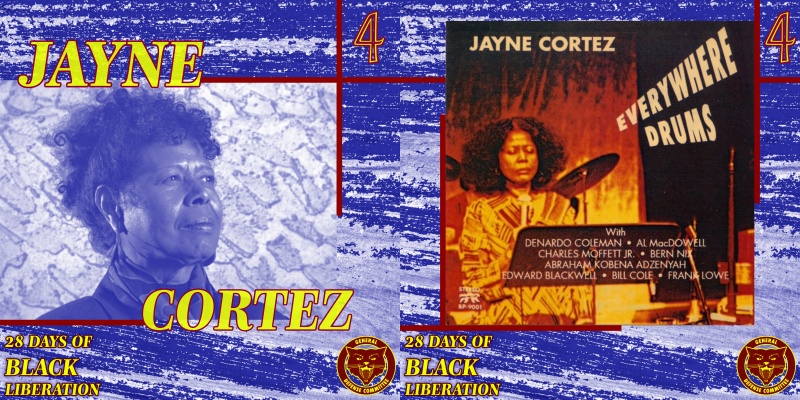Day 4 of the 28 Days of Black Liberation 2024 series
Amilcar Cabral once said about black/african culture & the poet:
“The universal value of African culture is now an incontestable fact; nevertheless, it should not be forgotten that African [hu]man whose hands, as the poet said, ‘placed the stones of the foundations of the world,’ has developed his culture frequently, if not constantly, in adverse conditions.”
Jayne Cortez embodies this incontestable fact with her artistry. Born in 1934 & returned to the ancestors in 2012, she was part of the Black Arts Movement, an activist, poet, pan-African feminist, blueswoman & surrealist. Her poetry is deeply rooted in the “African Way” of call & response, keen & humorous storytelling & improvisation. She formed a jazz band to accompany her poetry, The Firespitters based off Kponungo, a Cote d’Ivoire (African) mask said to embody an apt supernatural power that would combat any forces that might disrupt the well-being of the community. Her poems span across the political, social/personal, visions, dreams, real & surreal or as she details “supersurreal.” Cortez weaves in & out of the dialectic creating a poetic where most could find a radicalized entry to the struggle. She references the diaspora & requires her readers & listeners to understand the exploitative theft of slavery: “you think I accept this pentecostal church / in exchange for everything stolen.” Or her apt rejection of America, this time the english language & the ruling class: “Do you really think time speaks english / in the men’s room.” & “the ruling class will tell you that / there is no ruling class / as they organize their liberal supporters into / white supremacist lynch mobs.” She forces us to rethink/reject America’s version of humanity.
In ’63 while working with Fannie Lou Hamer to register black voters in Mississippi, Cortez realized, “I became more aware of the need for political power.” In ’91 Cortez & Ghanaian legend Ama Ata Aidoo formed the Organization of Women Writers of Africa to promote the written & oral traditions of African women writers.
Lastly, Cortez reminds us: “if we don’t organize & unify & / get the power to control our own lives / then we will wear…the stylized look of submission”
Interviews:
Jayne Cortez Interview on the podcast Stories from the World we Spin in
Jayne Cortez interview from 1992
Readings/Performances:
In the United States, the Black liberation struggle is the vanguard of the revolutionary class struggle. Black resistance to white supremacy has been the catalyst for nearly all critical social ruptures throughout american history. White workers choosing an alliance with the bosses instead of siding with the rest of the working class is the primary roadblock to revolutionary anti-capitalism in the US.
The GDC celebrates the Black liberation struggle and draws inspiration and lessons from its proud history in our struggle for the new world we are fighting for. In February we celebrate Black revolutionary culture, political prisoners, international figures and struggles, and moments in direct action that guide us in our continued, collective fight for liberation!

